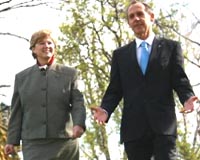| . |  |
. |
Washington (AFP) Dec 2, 2009 The UN climate chief voiced optimism Wednesday that the upcoming Copenhagen summit will offer immediate aid for developing nations but urged rich states also to chart out long-term help. Yvo de Boer, executive secretary of the UN Framework Convention on Climate Change, said it was vital that developing countries come out of the December 7-18 summit with assurances so they can plan more carbon-efficient economies. "We will need to see mechanisms created in Copenhagen that allow for prompt action -- immediate action -- the day the conference ends," de Boer told Washington-based reporters on a conference call. "That will only be possible if Copenhagen also agrees a clear financial package," he said. Britain and France called last week for a 10-billion-dollar fund for developing nations to tackle global warming. Britain committed to 1.3 billion dollars. US Senator John Kerry, a strong advocate of fighting climate change, has asked President Barack Obama to include three billion dollars for the effort in his upcoming budget. Kerry, who joined de Boer on the conference call, said quick US aid would show a "good-faith effort to put finance where it needs to be" in climate negotiations. "I think that there is a growing consensus on the short-term finance," de Boer said. But he doubted rich nations would agree on how to split an estimated 100 billion-dollar bill to help developing countries reduce emissions and adapt to climate change, which UN scientists warn is on course to worsen drought, floods and other severe weather. "I think it will be difficult, if not impossible, to reach agreement on the exact long-term cost-sharing in Copenhagen," de Boer said. "But Copenhagen must also offer the prospect of long-term finance as we seek to come to grips with this issue in the decades to come." Aid is considered a crucial component of a deal as developing nations are resisting demands by Western states and Japan to be treaty-bound to take action on climate change, arguing that rich countries bear historic responsibility. India on Tuesday shot down a proposal by summit host Denmark that was expected to seek a halving of global emissions by 2050, worried that the burden would eventually shift to developing nations. "For developing countries to agree to a mid-century reduction goal, they need to be confident that rich nations are reducing their emissions by enough to allow developing countries to grow economies and lift people out of poverty," de Boer said. Momentum has been building for a deal in Copenhagen after China and the United States, the world's top two emitters of carbon blamed for global warming, came up with plans to step up action. But de Boer, while encouraged by recent moves, warned it was not enough. UN scientists have recommended that rich nations curb emissions by 25 to 40 percent from 1990 levels by 2020. Obama has proposed curbing US emissions by about 17 percent by 2020, but from less ambitious 2005 levels. Kerry, who is spearheading climate legislation in the Senate, voiced confidence that lawmakers would approve emission cuts next year. "Copenhagen has the ability to create a synergy with the Congress and vice versa," Kerry said. Analysts said the US emissions targets and talk of aid -- which Obama could unveil in Copenhagen -- was meant to show the United States was serious despite the legislative delay. "Clearly their strategy is to go and say we're moving forward, we're making progress," said Alden Meyer, director of strategy and policy for the Union of Concerned Scientists. Obama has switched gears from his predecessor George W. Bush, who shunned the Kyoto Protocol as unfair and too costly. The treaty's obligations for rich nations to cut emissions expire in 2012. However, the run-up to Copenhagen failed to bring support for climate legislation in Australia, whose parliament earlier Wednesday rejected carbon cuts in a blow for Prime Minister Kevin Rudd. Share This Article With Planet Earth
Related Links Climate Science News - Modeling, Mitigation Adaptation
 Australian Greens Vote Down Carbon Emission Trading Laws
Australian Greens Vote Down Carbon Emission Trading LawsGerroa, Australia (SPX) Dec 2, 2009 In a sociopathic act of defiance the Australian Greens have walked away from Australia's first round of carbon economy reform. Via a critical procedural vote in the Australian Senate, a raft of law bills were set aside from a third and final reading. The development sets an ominous sign for the upcoming Copenhagen Climate Summit. The Global Greens Alliance is prepared to walk away from anything less that what they dictate is required today. ... read more |
|
| The content herein, unless otherwise known to be public domain, are Copyright 1995-2009 - SpaceDaily. AFP and UPI Wire Stories are copyright Agence France-Presse and United Press International. ESA Portal Reports are copyright European Space Agency. All NASA sourced material is public domain. Additional copyrights may apply in whole or part to other bona fide parties. Advertising does not imply endorsement,agreement or approval of any opinions, statements or information provided by SpaceDaily on any Web page published or hosted by SpaceDaily. Privacy Statement |